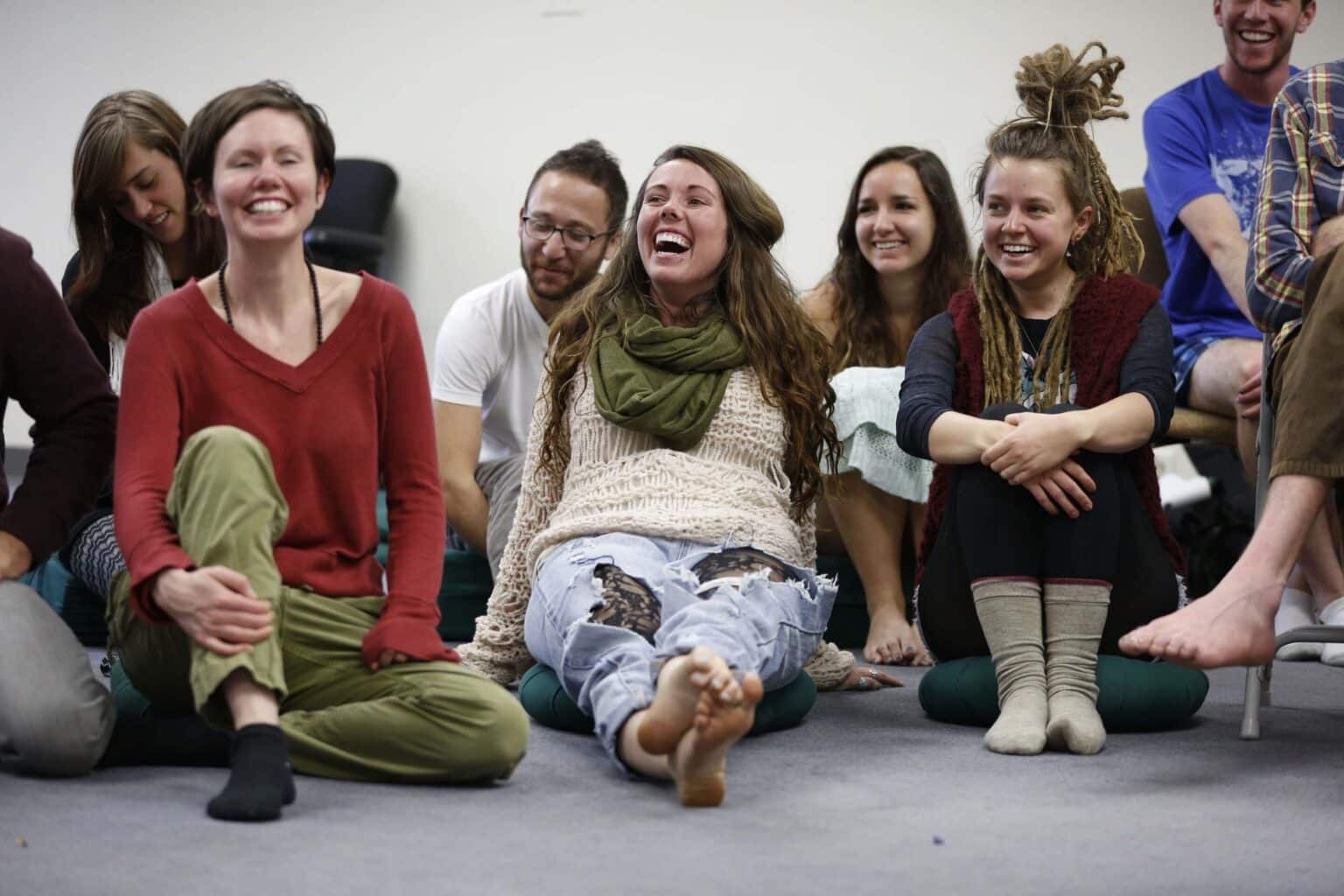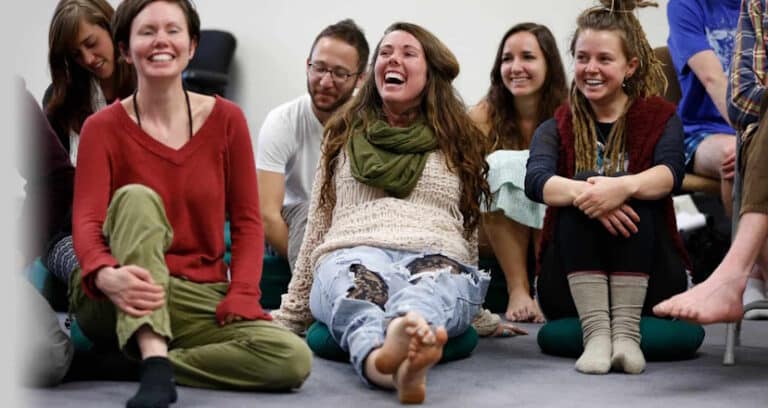BA in Psychology
Bachelor of Arts in Psychology
Contemplative teachings and modern psychology merge as you prepare for a career of service and catalyze self-discovery with Naropa’s Bachelor of Arts in Psychology.
Program Overview
Naropa’s Bachelor in Psychology combines contemplative and mindfulness teachings from a variety of wisdom traditions with modern psychology and neuroscience in a program designed to equip you with the skills and compassion needed to confidently serve others.
This psychology school has different options for each student to find the right path, with concentrations in contemplative neuroscience, psychological science, psychology of health and healing, somatic psychology, and transpersonal and humanistic psychology.
Naropa’s BA in Psychology will not only help you grow into your future career but grow and transform as a person as well.
Sharpening Intellect
The program provides a wide array of diverse courses, integrating Western and Eastern approaches to healing the mind and body. Some of these courses include Perception, Cognitive Science, Abnormal Psychology, Dream Psychology, Hakomi, Nutrition, Psychology of the Five Elements, Expressive Arts, and many others.
Nourishing Compassion
The program focuses on contemplative education, consisting of genuine kindness toward oneself and gentleness toward others. You’ll also have practical opportunities for volunteer fieldwork in a required service-learning course. This fieldwork provides valuable experience for occupations that require special sensitivity and skill in interpersonal relationships.
Outstanding Faculty
You will study with accomplished and insightful faculty like Jordan Quaglia, PhD, and Jennifer Bacon, PhD. Dr. Quaglia conducts groundbreaking research on mindfulness, compassion, and lucidity. Dr. Bacon offers Naropa bachelor of psychology students a unique perspective on addressing issues of overrepresentation in special education, racial and gender equity, child advocacy, and writing for social justice.
Quick Facts
- On-campus Degree
- 41 credit Hours
- 5 Concentrations
- 2 Contemplative Science Labs
- Internationally Recognized Faculty
- Senior Year Capstone Experience
- Contemplative Approach
- Admissions open for 2024
Program Format
Naropa University’s undergraduate program is a four-year, fully accredited Bachelor of Arts degree program. The psychology major offers an innovative approach to the study and practice of psychology, guided by the principle that psychological health and well-being are innate.
The major is 41 credit hours: 32 credits from the psychology core requirements and 9 credits from one of the concentrations. The core requirements include courses in psychology and meditation, as well as courses in Western psychology.
Students can delve deeper into their studies by choosing from five concentrations: contemplative neuroscience, psychological science, psychology of health and healing, somatic psychology, or transpersonal and humanistic psychology.

Course Spotlight
Psychology of Mindfulness Meditation
Degree
Requirements
A Bachelor of Arts degree (120 credits) consists of a Core Curriculum (24 credits) and at least one major, as well as minors and/or elective courses of the student’s choosing.
The Psychology Major includes 41 credit hours.
Psychology Major Requirements
Gateway
PSYB101 Introduction to Psychology (3)
PSYB314 Psychology of Mindfulness Meditation (3)
PSYB301 Research Methods and Statistics (3)
Take twice for 2 credits:
PSYB343W Contemplative Community Retreat (1) OR
COL299 Special Topics workshops (1)
Milestone: Mindfulness Track
- PSYB325 Awakening Compassion: Working with Others (3)
Milestone: Science Track
- PSYB368 Psychology and Neuroscience of Emotion (3)
Self-Selected Courses (choose one course from each set)
Set A:
PSYB304 Somatic Intelligence (3)
PSYB329 Approaches to Healing (3)
PSYB354 Transpersonal Psychology (3)
PSYB359 Learning from Trauma (3)
Set B:
PSYB345 Developmental Psychology (3)
PSYB357 Cognitive Science (3)
PSYB373 Social Psychology (3)
PSYB420 Abnormal Psychology (3)
Concentrations
Choose one of the following concentrations (9 credits):
Contemplative Neuroscience
This concentration provides a foundation for integrating neuroscientific approaches into the study of the contemplative mind. Students’ development in this area joins training in cognitive neuroscience with meditative experience. Topics include important findings from functional brain imaging studies on embodiment, perception, emotion, consciousness, mind wandering, and contemplative experience beyond mindfulness. Students use contemplative practice as a laboratory for investigating their own mind and brain while employing a variety of complementary psychological research methods, including phenomenology, experimentation, task performance, and experience sampling.
Required Courses:
PSYB301 Research Methods and Statistics (3)
PSYB462 Contemplative Neuroscience (3)
Choose 3 credits:
PSYB357 Cognitive Science (3)
PSYB368 Psychology & Neuroscience of Emotion (3)
Psychological Science
The Psychological Science concentration emphasizes the study of human experience and activity through systematic observation. Topics include development from infancy through adulthood, individual differences, embodiment, perception, emotion, consciousness, thinking, social influence, self, and other aspects of mental life. In addition to theoretical study, methods of obtaining and evaluating empirical evidence are explored, ranging from behavior assessment to contemplative phenomenology.
Required Course:
PSYB301 Research Methods and Statistics (3)
Choose 6 credits:
PSYB234 Perception (3)
PSYB345 Developmental Psychology (3)
PSYB371 Personality Theories (3)
PSYB373 Social Psychology (3)
PSYB420 Abnormal Psychology (3)
Psychology of Health and Healing
The Psychology of Health and Healing concentration emphasizes body-mind synchronization as the key to inner harmony and well-being. Students explore a diversity of ancient and modern healing methodologies and learn experiential techniques for balancing the spiritual and somatic aspects of health.
Required Course:
PSYB329 Approaches to Healing (3)
Choose 6 credits:
PSYB208 Embodying Process and the Individual (3)
PSYB209 Herbal Medicine (3)
PSYB239 Nutrition (3)
PSYB303 The Psychology of the Five Elements I (3)
PSYB323 The Psychology of the Five Elements II (3)
PSYB333 Hakomi Somatics (3)
PSYB359 Learning from Trauma: Understanding Its Effects and Building Personal Resources (3)
Somatic Psychology
The Somatic Psychology concentration emphasizes the practice of making meaningful connections between emotional process and the body’s expressions, sensations, and symptoms. Coursework includes three learning domains: 1) the historical and developing theory of body psychology; 2) the research and science regarding body psychology; and 3) the increase of body/self-awareness developed through experiential and movement-oriented classes.
Required Course:
PSYB304 Somatic Intelligence: The Neuroscience of Our Body-Mind Connection (3)
Choose 6 credits:
PSYB208 Embodying Process & the Individual (3)
PSYB255 Body-Mind Centering (3)
PSYB303 The Psychology of the Five Elements I (3)
PSYB328 Gestalt: Presence (3)
PSYB333 Hakomi Somatics (3)
Transpersonal and Humanistic Psychology
The Transpersonal and Humanistic Psychology concentration helps students synthesize two major forces in Western psychotherapy and appreciate their unique contributions to the understanding of mental health. These include the recognition of spiritual longing for wholeness as essential to psychological growth and the acknowledgment of the importance of the client-therapist relationship in the healing process.
Required Courses:
PSYB350 Humanistic Psychology (3)
PSYB354 Transpersonal Psychology (3)
Choose 3 credits:
PSYB225 Family Systems (3)
PSYB328 Gestalt: Presence (3)
PSYB330 Jungian Psychology (3)
PSYB355 Dynamics of Intimate Relationships (3)
PSYB430 Exploring Dream Psychology (3)
No Concentration Option
Students may elect to not have a thematic concentration. There are no required courses. Nine credits are to be selected from within PSYB.
Capstone: Mindfulness Track
- PSYB415 Maitri: Working with Emotions (3)
Capstone: Science Track
- PSYB462 Contemplative Neuroscience (3)
All Students
COL450 Internship (3)
Capstone I (3)
Capstone II (3)
Total Credits: 41
Why Choose Naropa?
Research Opportunities
Naropa's BA in Psychology offers chances for collaborative research with globally recognized faculty. As a leading institution in contemplative psychology in the Western context, Naropa is committed to exploring the impact of contemplative practices on both individuals and communities.
Senior Year Experience
Your bachelor’s in psychology culminates in a senior-year capstone experience: an exploration of Maitri Space Awareness, a community field placement focusing on social change, and a multidisciplinary senior project aimed at challenging both intellect and intuition.
Scholarships
Naropa offers scholarship opportunities for students admitted to the psychology degree who are enrolled full-time in at least 12 credit hours each semester, with awards determined by the student's cumulative GPA.

How this Program Prepares You
Innovative Foundation in Psychology
Learn from internationally recognized faculty in a psychology school that views learning as a journey. Naropa’s BA in psychology starts at the center of the individual with contemplative psychology and mindfulness practice before moving into traditional and psychological theories.
Research Opportunities
Naropa’s BA in psychology offers collaborative research opportunities with world-renowned faculty. Through these research opportunities, students contribute to advancing the global understanding of meditation and other phenomena associated with human consciousness.
Senior Year Capstone Experience
In the final year of your psychology bachelor’s program, you’ll engage in a senior-year capstone experience. This includes delving into Maitri Space Awareness, participating in a community field placement with a focus on social change, and undertaking a multidisciplinary senior project designed to challenge both intellect and intuition.
What You'll Learn
Foundation in Psychology
Students understand and apply contemplative principles to Western psychological science.
Understanding of Psychological Science
Students enrich their approach to mind-body healing with peer-reviewed research.
Commitment to Inclusivity
Students work for social change and commit to diversity awareness in the community.
Career Readiness
Step into a meaningful career that allows students to serve others.
Mindfulness
Expand self-awareness to increase awareness of and compassion for others.
Career Opportunities with a BA in Psychology
Graduates of the BA in psychology have sharpened their intellect, deepened their intuition, nourished compassion, and embodied confidence. These attributes form a crucial foundation for success in their careers. Some roles may require additional education, certification, or licensing.
Graduates of Naropa’s BA Psychology program can go into these careers.
- Clinical Psychologist: Provide therapy and counseling for better mental well-being.
- Psychiatrist: Diagnose and treat mental illnesses with therapy and medication.
- Clinical Neurologist: Treat cognitive and emotional aspects of neurological conditions.
- Mental Health Counselor: Support individuals in managing mental health challenges.
- Industrial Psychologist: Enhance workplace effectiveness through applied psychology.
- Substance Abuse Counselor:Guide individuals in overcoming substance abuse.
- Career Counselor: Guide individuals to define and achieve their career goals.
- Marriage and Family Therapist: Provide counseling to couples and families.
- School Psychologist: Enhance student well-being through psychological support.
- Psychology Teacher: Educate students on human behavior and mental processes.
Hear from a Graduate
Naropa offers an education that allows one to go within, then go out into the world. This allows space for spiritual growth and the understanding of what it means to be a compassionate person. This also allows space for one to understand one’s own pain and suffering. Being at Naropa is like an education retreat for me.
FAQs About the
BA in Psychology
What area of study is psychology?
What is the difference between a BS and a BA?
Is psychology a BA or a BS?
What job can I get with a Bachelor's in psychology?
Can you be a therapist with a bachelor's in psychology?
Can I be a psychologist with a bachelor's degree?
Learn More About the Program

Connect
with your counselor
Rachel Thompson
Assistant Director of Undergraduate Admissions
Prospective students with last names A-G
- 303-970-9831
- rachel.thompson@naropa.edu
- Schedule Appointment

Connect
with your counselor
Jenna Priest
Prospective students last names H-Z
Ready to Apply?
Admission Requirements
Naropa University’s unique approach values both academic excellence and the willingness to carry out introspective work.
Learn more about admission requirements and the application process for prospective students.
Undergraduate Students
Students with a 3.0 GPA or Higher
Applicants who can demonstrate a strong history of academic performance are welcome with minimal eligibility criteria.
Students with Less than 3.0 GPA
If you wish to benefit from a Naropa education and will contribute to our growing community, we strongly encourage you to submit your application, regardless of any past academic challenges.
Transfer your College Credit
You can transfer 60 or more transferable credits from previous studies by presenting an official college transcript on top of your application.
Read our admission requirements guide for first-time and transfer students to apply to Naropa.
International Students
Costs and Financial Aid
Undergraduate Scholarship Opportunities






